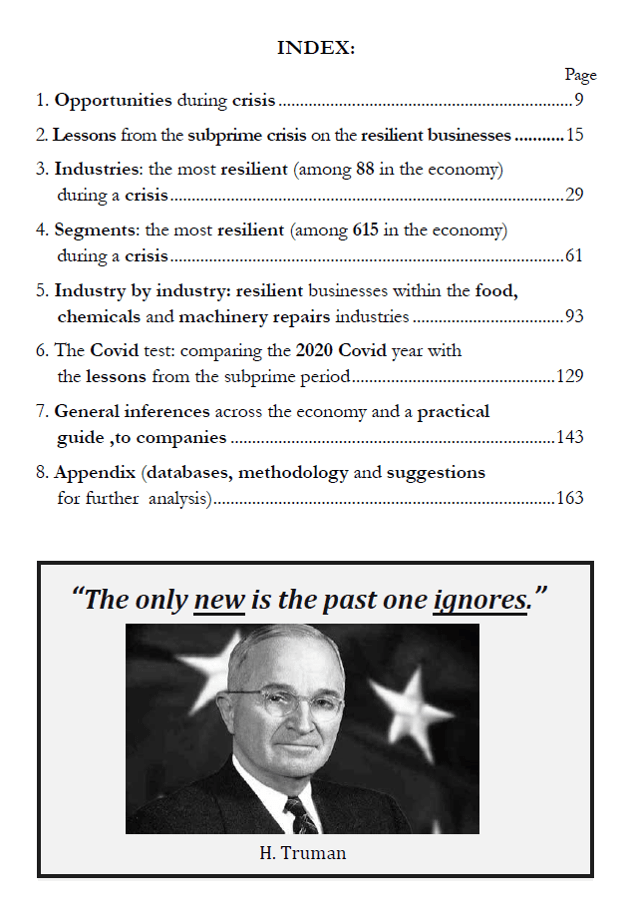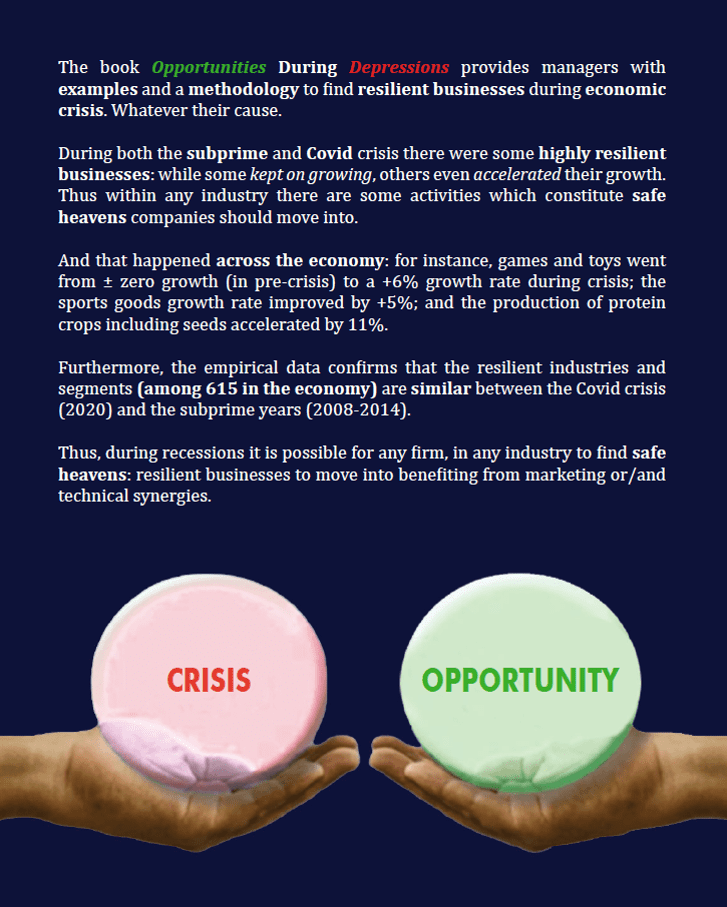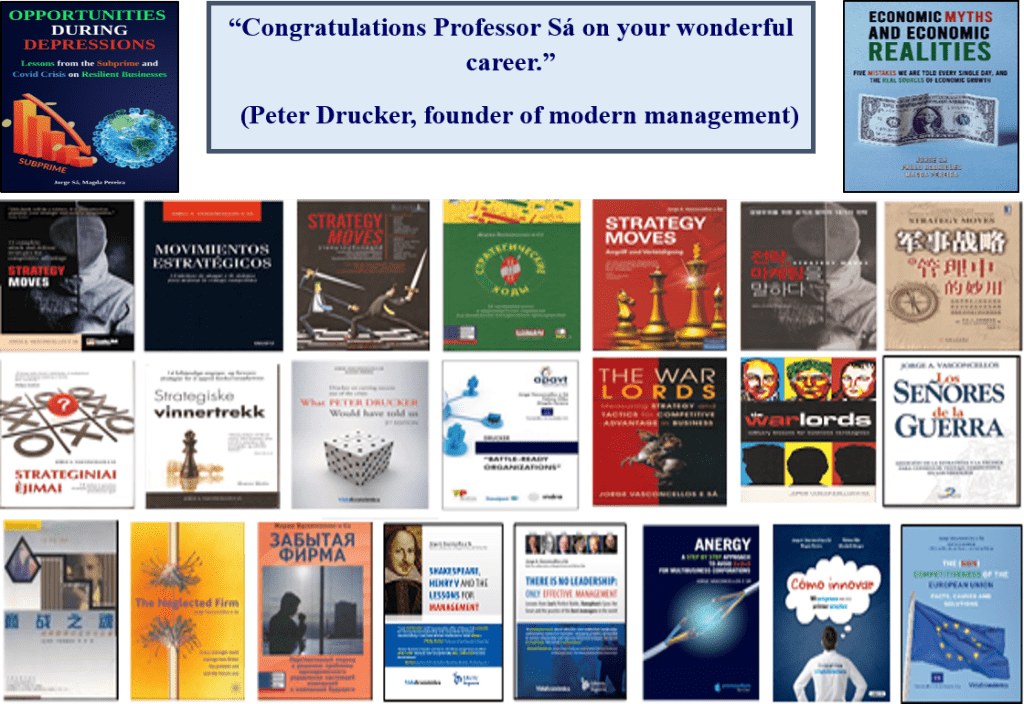Professor Jorge Sá (PhD Columbia University; MBA Drucker University; Jean Monnet Chair; Peter Drucker speaker), an international speaker and author, has just published a new book that came out this summer:
“Opportunities During Depressions: lessons from the Subprime and Covid crisis on resilient businesses”
This book which focuses on opportunities during internal crisis (recessions/ depressions) and was written for large audiences but based on empirically researched articles published in academic journals (blind refereed/scopus), provides examples and a methodology to find resilient businesses during economic crisis. Whatever their cause.
During both the subprime and Covid crisis there were some highly resilient businesses: while some kept on growing, others even accelerated their growth. Thus within any industry there are some activities which constitute safe heavens companies should move into.
And that happened across the economy: for instance, games and toys went from ± zero growth (in pre-crisis) to a +6% growth rate during crisis; the sports goods growth rate improved by +5%; and the production of protein crops including seeds accelerated by 11%.
Furthermore, the empirical data confirms that the resilient industries and segments (among 615 in the economy) are similar between the Covid crisis (2020) and the subprime years (2008-2014).
Thus, during recessions it is possible for any firm, in any industry to find safe heavens: resilient businesses to move into benefiting from marketing or/and technical synergies.
To know more about this new book, enclosed below is the cover, index, back cover and a summary with further detailed information.



SUMMARY OF THE BOOK: “Opportunities during Depressions: lessons from the Subprime and Covid crisis on resilient businesses”
This book presents five basic facts (based on Eurostat data):
First: during the last (subprime) economic crisis (from 2008 to 2014) some business activities (both industries among 88 of them in the economy and industry segments among a total of 615) were highly resilient;
Second: their resilience was of two types: 1) some kept on growing during the crisis (first type) and other even 2) accelerated their growth (second type).
Third: that happened across the economy. For instance:
Photographic equipment (e.g.) increased its growth year rate from +3,4% (before the subprime crisis: years 2000-2007) to +4,6% (during the subprime crisis: years 2008-2014). But computers and peripheral equipment went downhill from -3,3% to -11,8%.
Also (e.g.) poultry meat augmented from zero growth (before the subprime crisis) to +1,1% (during the crisis), but vegetable juices went from +1,8% to -2,9%. And ice cream from +2,5% to -5%.
Fourth: the data for the Covid crisis year (2020) confirms that the resilient industries and segments are similar to those of the subprime crisis years (2008-2014).
So (fifth), during recessions:
- 5.1. In spite of economic decline;
- 5.2. It is possible for any firm, in any industry, to find safe heavens: resilient businesses to move into, with marketing or/and technical synergy.
A FEW OTHER EXAMPLES OF RESILIENT BUSINESSES during both the subprime and covid crisis (BASED ON THE EUROSTAT/ official eu statistics office)
1. Within the fruits industry (which the Eurostat divides in more than 10 segments):
- some kept on growing at the same year rate before and during the crisis (olives);
- while others even accelerated their growth: tropical fruits went from -1,2% (in years 2000-2007 before the crisis) to +1,2% (during the crisis: 2008-2014).
- However the consumption of many types of fruits decreased sharply (citrus, dessert grapes, etc.).
2. The manufacture of machinery is composed by more than 20 segments. Before the subprime crisis (2000-2007) the industry was growing at an year rate of +4%, but during the crisis (2008-2014) it decreased at -1,5%.
However, some types of machinery (e.g. for metallurgy) accelerated their growth: from -1,5% (before the crisis: years 2000 to 2007) to +2% (during the subprime crisis: years 2008-2014).
3. The average year growth of the beverages industry decreased from (before the crisis) +1,5% to -1% (during the crisis). And all segments within the industry declined sharply: wine, mineral waters, etc. The single exception was after meal beverages such as liquors and vermouths which increased at +13,41% year after year, during the crisis.

1. Jorge Sá is an expert on Peter Drucker and Philip Kotler, founders of modern management and modern marketing, respectively, with whom he studied and who offered letters of recommendation for his books and endorsements for his work.
2. Has a master’s degree from the Peter F. Drucker Graduate School of Management in California and a doctorate(PhD) in Business Administration, from Columbia University, in New York, where he was research, teaching assistant, and graduated with honors (always Dean’s list, Beta Gamma Sigma). Also holds two undergraduate degrees (in business administration and economics) and a graduate degree in Macroeconomics.
3. Was awarded the Jean Monnet Chair by the Jean Monnet Foundation in Brussels, and his books translated into twelve languages: English, Portuguese, Spanish, Chinese (Mandarin), Russian, Ukrainian, German, Lithuanian, Thai, Korean, Norwegian and Iranian, received endorsements, among others, from Peter F. Drucker, Cecily Drucker, Al Ries (author of the bestsellers Marketing Warfare and Positioning), Don Hambrick (Professor at Columbia University and The Pennsylvania State University), Karl Moore (Professor at Oxford and McGill University), Peter Starbuck (President of the London Drucker Society) and Philip Kotler.
4. Besides nearly forty articles published in blind refereed academic reviews and journals of economics, business administration and medicine, he has addressed conferences and given seminars at several institutions including TED USA (https://youtu.be/SOkjPVi1Fts), London Business School, Drucker University, IESE, Glasgow Business School, ESSEC (France), ESSAM (European Consortium of Business Schools), Manchester Business School, George Washington University, Oxford, etc. Has also addressed conferences and presented articles in academic and non-academic meetings, such as Academy of Management, Western Economic Association, Peter Drucker Society of Europe, at the European Commission, etc.
5. Has worked as private consultant, non-executive director or taught in the executive programs of multinational companies such as: Coca-Cola, SHELL, Unisys, IBM, Price Waterhouse, KPMG, Glaxo, British Petroleum – BP, Dun & Bradstreet, Deloitte & Touche, Makro (Metro group), Systéme U, I.F.A, Intermarché, Mini Prix Bonjours, Accenture, Watson Wyatt, Cap Gemini, Cesce, Scottish & Newcastle, Sara Lee, Total, Johnson & Johnson, Pfizer, Logica, Indra, Grandvision, Jafep, Euler Hermes, Cosec, Pestana Group Hotels, Tivoli Hotels & Resorts, Millennium Bank, Julius Baer, SGG, Henkel, Abencys, Broadbill, Volkswagen Group, McDonald’s, MiTek, United Steel Products, Base Group, UnitedHealth group, Inapa, Vodafone, IDC, Merck, BPI Bank, Milestone, Fijowave, Foxpak, ND Sports, LLR-G5, Horan, Prodieco, Dennison, Grid Finance, Bluemetrix, European Federation of Pharmaceutical Industries and Associations, Microsoft, etc.
6. His hobbies are History (wrote several books on the lessons of military campaigns for management) and football (degree as a professional coach). He speaks and writes (by alphabetical order) English, French, German, Portuguese and Spanish. He lives between Lisbon and Rio de Janeiro. And the office, Vasconcellos e Sá Associates (www.vasconcellosesa.com), provides support for research and other activities.

For more information on the books and conferences by Professor Jorge Sá please check our website at: www.vasconcellosesa.com or contact us at associates@vasconcellosesa.com .
– Peter Drucker expert
– Speaker on Peter Drucker
